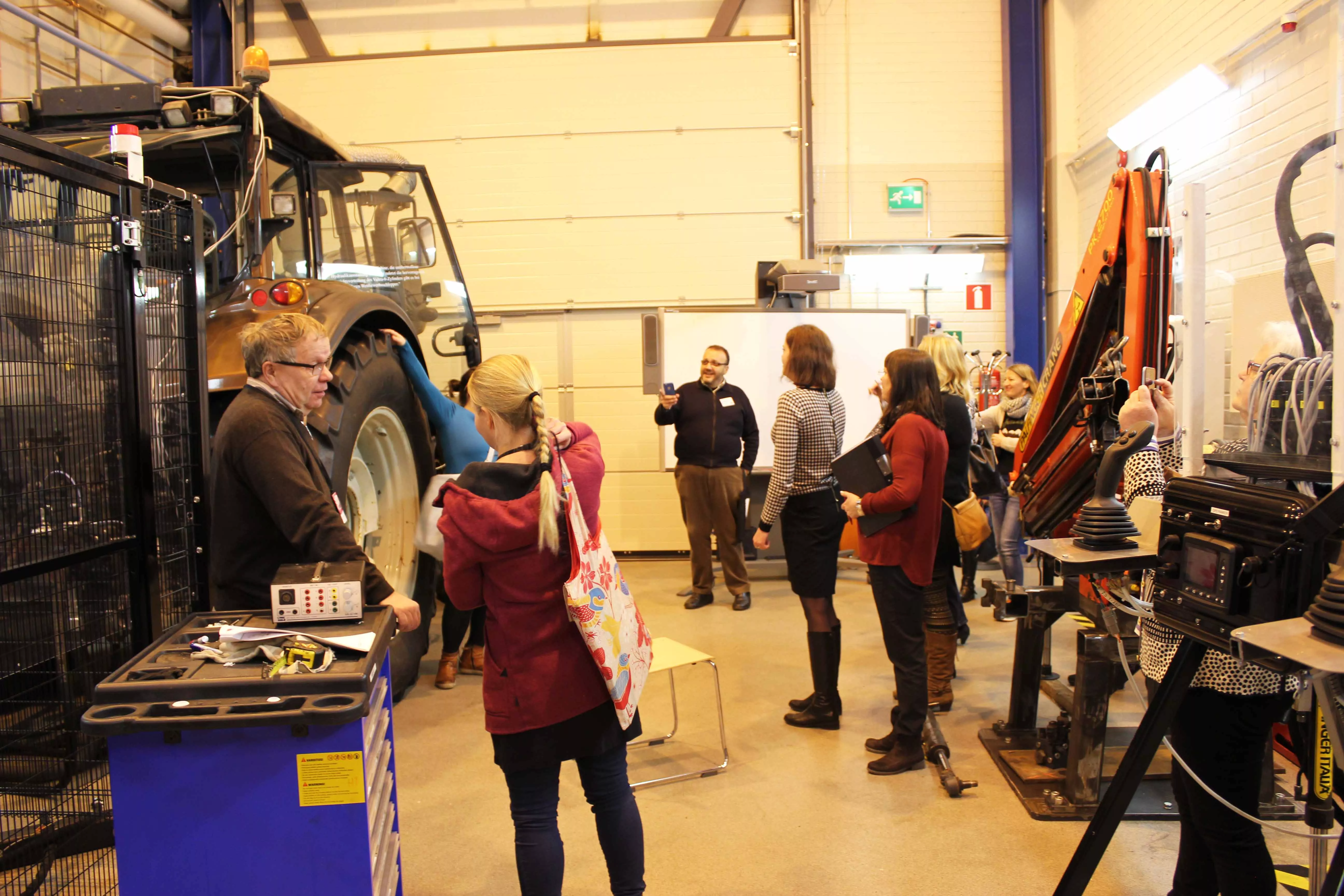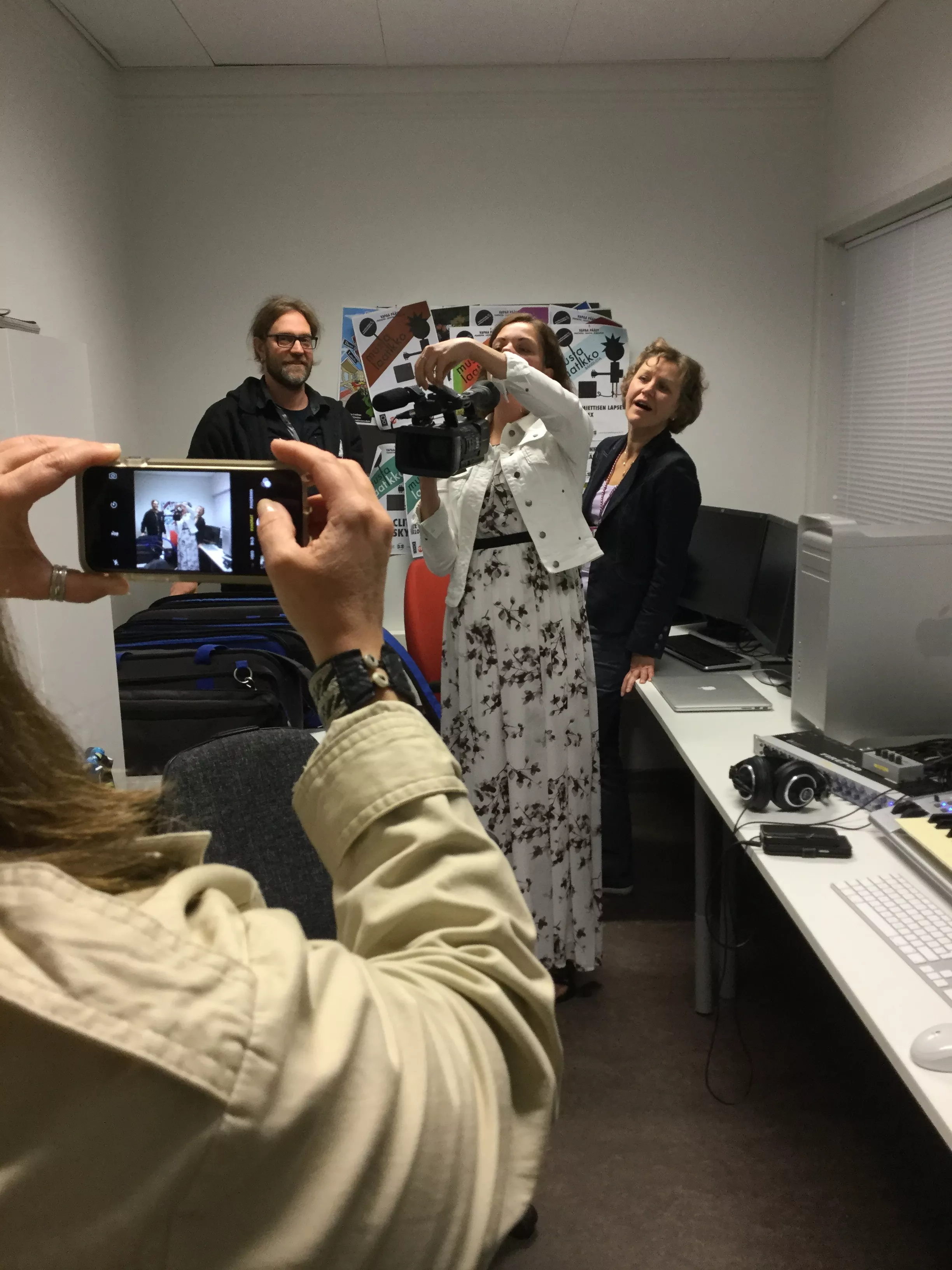Adults acquiring digital skills – insights into the Finnish approach and the results of the Erasmus+ project Digi4Adults
by Henna-Riikka Ahvenjärvi
Adults Aquiring Digital Skills, also known as Digi4adults, is an Erasmus+ funded project (1.9.2015 - 30.11.2017). Coordinator of the project is TAKK Tampere Adult Education Centre (Finland) and other partners are Berufsförderungsinstitut Wien (Austria), VUC Storstrøm (Denmark), CEPA San Bartolome de Tirajana (Spain) and Vuxenutbildning Sundsvall Timrå (Sweden). The objective of the project is to create an international on-going collaborative grassroots approach for trainers in adult learning. This approach includes a training process, in which different teaching methods are developed and tested. The purpose of these methods is to improve the basic skills and especially digital competencies of adult learners to ensure their possibilities for life-long-learning.
Development of basic skills
The main rationale of Digi4Adults approach is that digital competence training can be integrated in any form of adult education, and can even enrichen the delivery of learning across all thematic fields. This way it is also possible to have more time to practice basic skills, when it can be done during other themes.
PIAAC (Survey of Adult Skills) is one of the indicators in Finland showing that there are large differences in literacy, numeracy and digital skills between different population groups. In particular, older age groups, immigrants, and unemployed people often have significant shortcomings in their skills. Therefore, it is important to develop methods to support the development of basic skills.
Digi4Adults project has developed and tested a functional training model, which gives teachers and trainers possibilities to develop their teaching through developing and exchanging teaching methods

Getting to know each other's schools, trainers and students has been interesting and rewarding.
CDCIL training process
Content and digital competence integrated learning (CDCIL) training process is the core of the Digi4Adults project. The CDCIL training model aims at increasing the digital competence of adult education trainers. It is based on peer learning in pairs of adult education trainers. The formation of peer-pairs across different education providers is encouraged. The training process consists of six phases:
- Phase 1 Motivate: Participants orientate themselves online for the CDCIL training process.
- Phase 2 Ground it: Lectures, collaborative group work and visits.
- Phase 3 Practice it: Collaborative group work to practice CDCIL.
- Phase 4 Work it out together: Peer learning on CDCIL continues in participant’s own organization.
- Phase 5 Make it public: Collaborative group work to publish the outcomes and results.
- Phase 6 Prove it: Certification of peer learning and CDCIL competence acquired in CDCIL training process.
In its definition of digital competence, the model draws on the DIGCOMP framework. This framework captures various aspects of digital competence under the five dimensions of information, communication, content creation, safety and problem solving.
The peer learning approach adopted in this model is inspired by the SECI model (Socialization, Externalization, Combination and Internalization), which regards knowledge creation as continuous transfer, combination and conversion of the different types of knowledge as users practice, interact and learn. The CDCIL model facilitates learning and content creation (in form of CDCIL caselets) in peer pairs, and thus emphasizes interaction and co-operation.

Face-to-face meetings also provide a good foundation for collaborative online working.
Caselet Track
The methods produced within CDCIL training process form a track of caselets in Digi4Adults project website. Caselet is a method, which enable trainers in adult education to improve the digital competence of their target groups. Each caselet integrate development of digital competencies into content themes and subjects of certain studies. Caselets can be applied to different themes, situations and target groups with guidelines for execution. Short-term staff trainings have been an essential part of developing and exchanging these methods.
Caselet Track is an Open Educational Resource, which includes different kind of caselets, as well as experiences and feedback of using the caselets. Anyone can download the caselets from Digi4Adults website and try them out. For further development, it would be valuable to get feedback on these experiments, and that is why there is a possibility for rating and commenting included on the website.
Open call, final event and webinars
It is also possible for anyone to submit a new caselet to Digi4Adults Caselet Track. Digi4Adults is launching an open call for trying out Digi4Adults caselets and submitting new caselets. Contributions for this OER are highly appreciated, because one of our goals is to have continuance with the Caselet Track also after the Digi4Adults project has ended.
Digi4Adults final event will be arranged during DigitalDays 2017 in Vienna. During this event our teachers and trainers will be presenting the Caselet Track with all the caselets. There will also be open discussions during which the participants are able to ask questions, comment and reflect.
During the autumn 2017 there will also be two webinars presenting Digi4Adults caselets and informing about the open call. Previous webinars have been an excellent possibility to develop the use of webinars and disseminate the methods and other results of the Digi4Adults project.

Learning, doing and experimenting together have been important ways of working during the weeks of short-term staff training.
Current issues in Finnish Education
According to Finnish National Agency for Education current important issues in the Finnish education are e.g. learners with immigrant background, vocational education and training reform, changes in funding, and the development of learning environments focusing especially on ICT. National goals for basic education and transversal competencies include e.g. thinking and learning to learn, multiliteracy, and ICT competence. Conception of learning is learner centered: the learner has an active role in setting targets, reflecting and analyzing as well as solving problems.
Finnish National Agency for Education has founded a new experimental, development and innovation center at 1.3.2017. The idea is e.g. to support the use and development of exploratory and functional learning and phenomenon-based learning. It is essential to develop pedagogical activity to maintain and increase quality in education.
Conclusions
Transnational project cooperation can be an important part of developing education more widely also in national and regional level. One of the key results of developing the training process is the use of peer learning, which enables and encourages teachers and trainers to create and try out new teaching methods together. These methods are an excellent way to develop adult learners´ basic skills as an integrated part of their core studies.
In Digi4Adults project we are developing the evaluation process from many angles. Evaluation is an essential part of quality management: with feedback information, self-evaluation and peer-project evaluation we are able to gather important data for further development.

Henna-Riikka Ahvenjärvi
Henna-Riikka Ahvenjärvi (MA, MBA) is coordinator of project activities at Tampere Adult Education Centre TAKK, and project coordinator of Erasmus+ Adults Aquiring Digital Skills project. She is also teacher of finnish language and literature, communication, ICT, social media, and project management.
henna-riikka.ahvenjarvi@takk.fi
More information:
Digi4Adults project http://www.digi4adults.se/
DigComp https://ec.europa.eu/jrc/en/digcomp/digital-competence-framework
Documentation of CDCIL model http://bit.ly/d4a_cdcil
Finnish National Agency for Education 2017: Education in Finland http://www.oph.fi/download/175015_education_in_Finland.pdf





NSS Bulgaria
Поздравления!
Свързване финланския опит с темата за придобиване на основни умения от възрастни обучаеми. Важна публикация в контекста на актуалните идеи, представени пред широка общественост на проф. Галин Цоков - министър на образованието и науката.
Повече подробности за идеите на проф. Галин Цоков можете да откриете чрез този линк: Министър Цоков пред Dir.bg: Предлагаме образование, базирано на феномени - по финландски модел | Днес.dir.bg